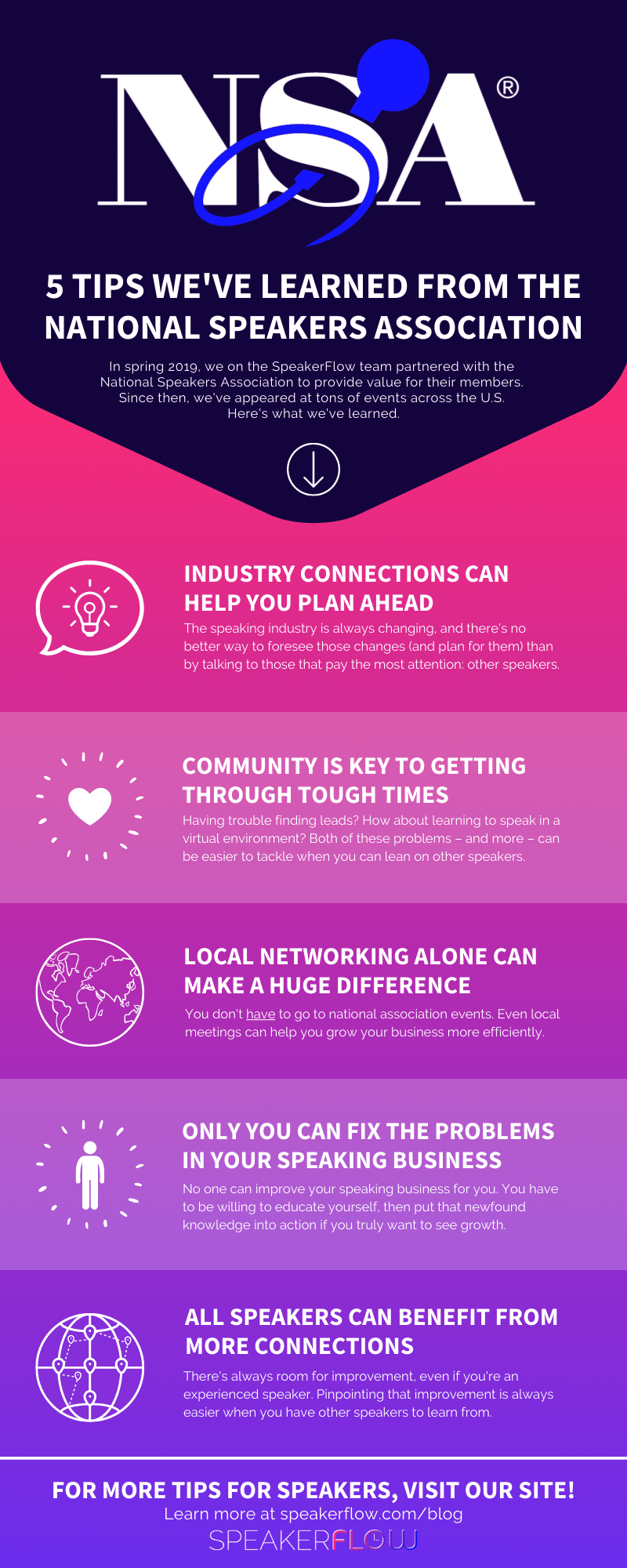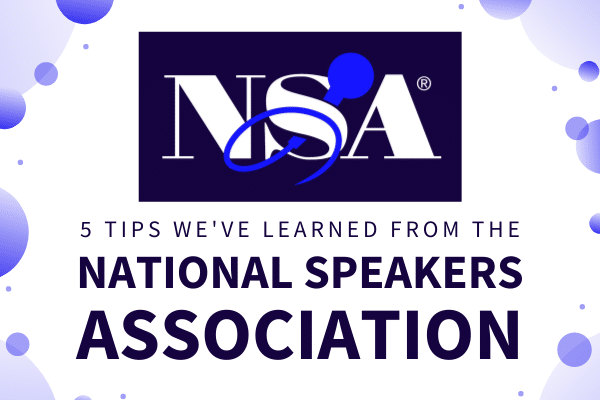When was the last time you heard the saying, “There is no ‘I’ in ‘team’?” Maybe it was at work or a volunteer-run meeting. Maybe it was at home with your family. Either way, if you’re like the majority of our team, you’ve heard it countless times and you know it to be true. Personally and professionally, you get further if you work with others in your industry, not solely with your own interests in mind. We got a fresh reminder of this saying when, in spring 2019, we partnered with the National Speakers Association. Initially, we went into our first event thinking only about what we were there to do for the speakers in attendance. However, what we didn’t count on was how much they would teach us in return.
What were the vast majority of speakers worrying about on a daily basis? Who should aspiring speakers look to for examples? Did it really matter if you were part of a speaker association or not? Although we couldn’t answer any of these questions at the time, since then, we’ve learned a lot.
Here, we’ll break down five of the biggest lessons we’ve learned. We’ll also cover how they can affect you, as a speaker, and how you can use them to better your speaking business in the upcoming year. That way, whether you’re a current member of the National Speakers Association or not, you’ll be able to make use of our know-how.
More industry connections can help you stay ahead of the curve.
First and foremost, you don’t know what you don’t know. When we first appeared at a National Speakers Association event, we had no way of knowing what attendees expected of us. We didn’t know if our sales language was going to be confusing or if speakers would connect with our team members. We didn’t even know how to best explain our own products and services!
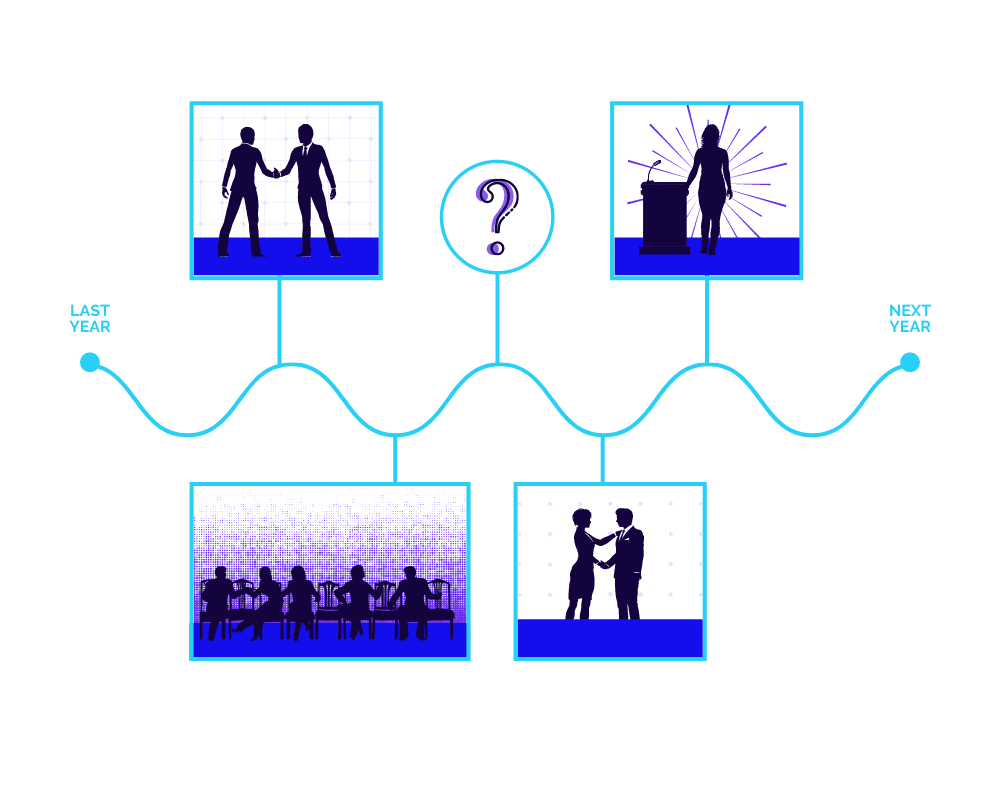
That said, after connecting with attendees and other vendors, more and more of these pieces fell into place. Because we were able to connect with people who had worked in the speaking industry longer than we had, we were able to pool our experiences and knowledge with theirs. This not only resulted in growth throughout our business. It also kickstarted a handful of partnerships, many of which are still in place today including our partnership with Sam Richter for the Speaker Intel Engine and our integration between eSpeakers and our CRM.
In the same way, as a speaking business owner, it can be hard to pin down where you’re losing money or where you can improve. Even if you’re working hard to build your business, you don’t know what you don’t know, and sometimes the best thing you can do is ask for an outside opinion or look to your peers.
Not sure how to jump into a sales mindset when you have no sales experience? Learn from sales and leadership speaker Meridith Elliott Powell! Looking for more ways to get your speaking business on the map? Connect with marketing expert David Newman!
Whatever questions or concerns you’re facing and whatever curveballs the speaking industry may throw your way, rest assured that as long as you’re willing to connect with other speakers, you’ll never be alone.
Community is key to getting through tough times.
The second lesson we’ve learned from working with the National Speakers Association is a simple one: community is crucial. Besides the day-to-day challenges of managing a speaking business, there will inevitably be developments that throw the whole industry for a loop. In fact, since the National Speakers Association was founded in 1973, they’ve seen disruptions time and time again, including the introduction of the world wide web in 1993 and the advancement of LGBTQ+ rights and the #MeToo Movement in the 2010s.
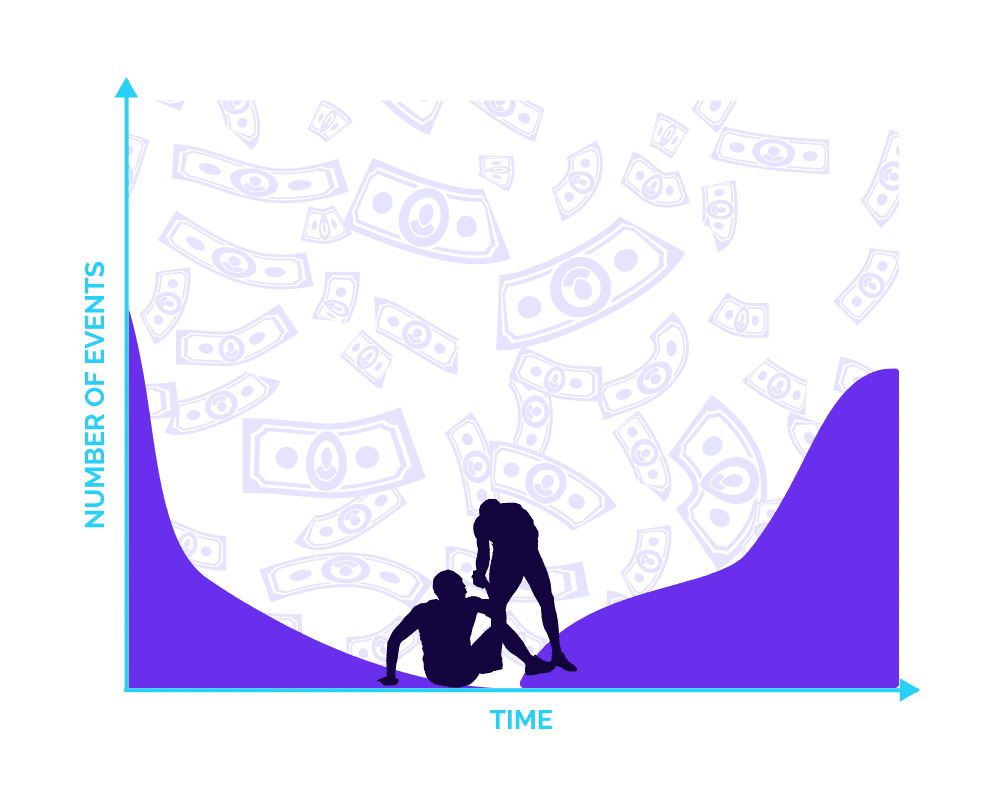
Because of these changes – and others like it – professional speakers have been repeatedly forced to adapt whether they want to or not. Sometimes, this has meant changing what topics we focus on. Other times, it’s meant adjusting the format of speaking itself. But, either way, having the support of a community is proven to make those adjustments easier to bear.
Recently, we experienced another round of disruption in early 2020, thanks to the COVID-19 pandemic. At the time, the worldwide “lockdown” went into effect seemingly overnight, leaving many speakers with empty calendars and no clear plan for the rest of the year. Fortunately, the speaking community stepped up to help thought leaders rebuild or pivot. For example, to help inexperienced speakers, industry veterans shared their knowledge for free. To help speakers stand out, event management software company eSpeakers created a virtual speaking certification program.
Additionally, dozens of vendors, associations, and consultants – including us – offered their services either completely free or at a dramatically discounted rate. After all, as Booker T. Washington said, “If you want to lift yourself up, lift up someone else.” In other words, we can all learn from our speaking industry connections when times are good but only if we also support those connections when times are bad.
Simply networking on a local level can make a huge difference.
Moving on, the third lesson we learned from collaborating with the National Speakers Association is that there’s no “right” way to engage with the speaking industry.
Among our own team members, when we originally partnered with the National Speakers Association, we assumed that national events would be our best bet to connect with speakers. They attracted a ton of attendees, we could host a booth, and we could network with other industry vendors. Plus, many prestigious speakers regularly showed up. What could be better than that, right?
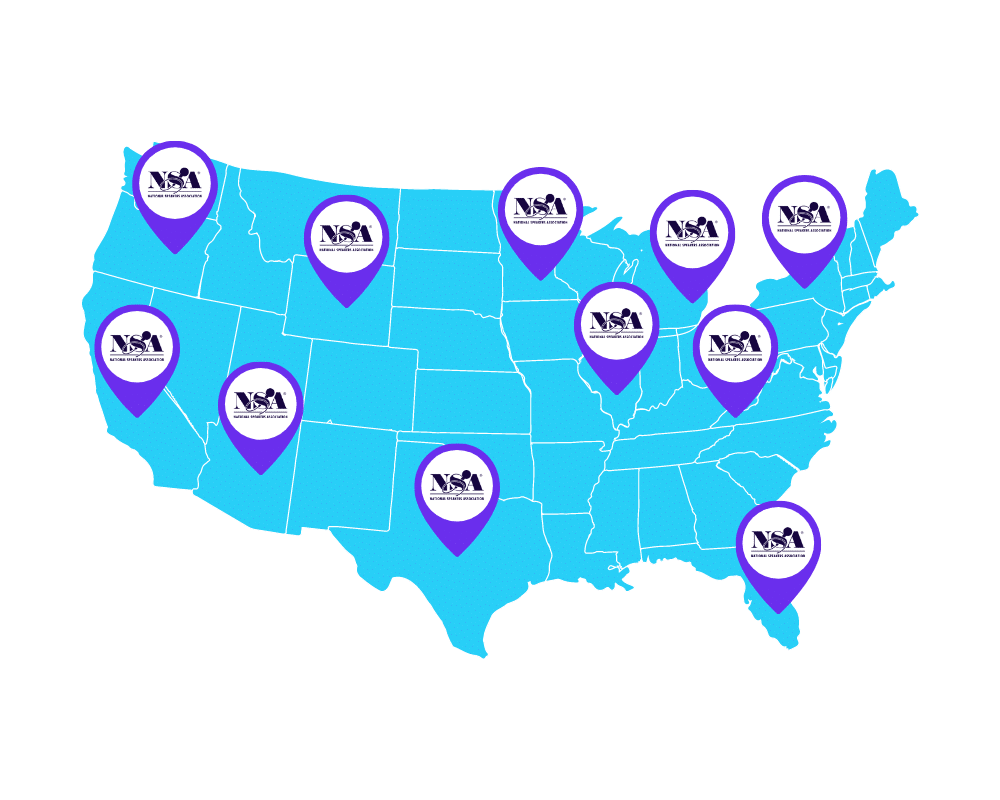
Turns out, although national events are undeniably rewarding (and fun!), they also come with plenty of cons. For instance, remember the booth I mentioned? Those don’t come cheap. Remember the networking I mentioned? That also doesn’t come cheap, as it generally means flying multiple members of our team to the event location. As a new and small business, each of those costs stung, even though we also saw some return from them.
To reduce that cost – and the time we were “out of office” for in-person events – we opted instead for a smaller approach. Instead of just gearing up for national events, we connect with local National Speakers Association chapters throughout the year. Instead of using national events alone to grow our network, we meet with speakers almost daily for virtual coffees and discovery sessions.
Ultimately, local and virtual events have been the most important components of our network, and the same potential exists for you, too! If you’re looking for more connections within the speaking industry, don’t feel pressured to immediately jump to national or international get-togethers if you can’t afford it (or if you simply don’t want to). Just start at a local or state level and build up from there when you’re ready.
Only you can fix the problems in your speaking business.
Next up and fourth in our list of National Speakers Association lessons is an age-old requirement: If you want something done right, you have to do it yourself.
From many speakers we’ve met, we’ve heard variations of the same statement. Some have said, “I don’t want to learn to sell. I just want to hire someone to do it for me.” For others, it’s more like “I don’t want you to explain what I can do better. Can’t you just fix it for me?”

Unfortunately, even if you want to avoid unpleasant tasks, only you can fix your speaking business. If you’re not booking as many gigs as you want, guess who has to learn how to solve that problem? You do. If your marketing efforts aren’t working, who do you think has to be the first to master them? You do.
Regardless of which part of your business you’re looking at, you are the key to making it improve. If you’re not willing to put in the work, any advice from your colleagues or an external consultant won’t stick. You also won’t be able to outsource it to a virtual assistant or sales person. Essentially, if your speaking business is a house, you’re the foundation. So, if you don’t have a firm grasp on your business processes yourself, any additional team members are going to have problems, too.
To avoid this, the three biggest words to keep in mind are “Get Sh*t Done”. At any local, national, or international National Speakers Association event, you’re there to grow your business. But, if you truly want to succeed, you also need to leave those events with the intent to execute on what you’ve learned. You need to get sh*t done. 👍
Speakers of all experience levels can benefit from more connections.
Finally, the fifth and most important we learned from working with the National Speakers Association is that everyone – and I mean everyone – benefits from connecting with other speakers on a regular basis. Admittedly, if you’re a new speaker, you may already be looking at a speaker association, as you already know you need to learn from others to succeed. But, even if you’re a seasoned expert, there is always something you can be doing better.
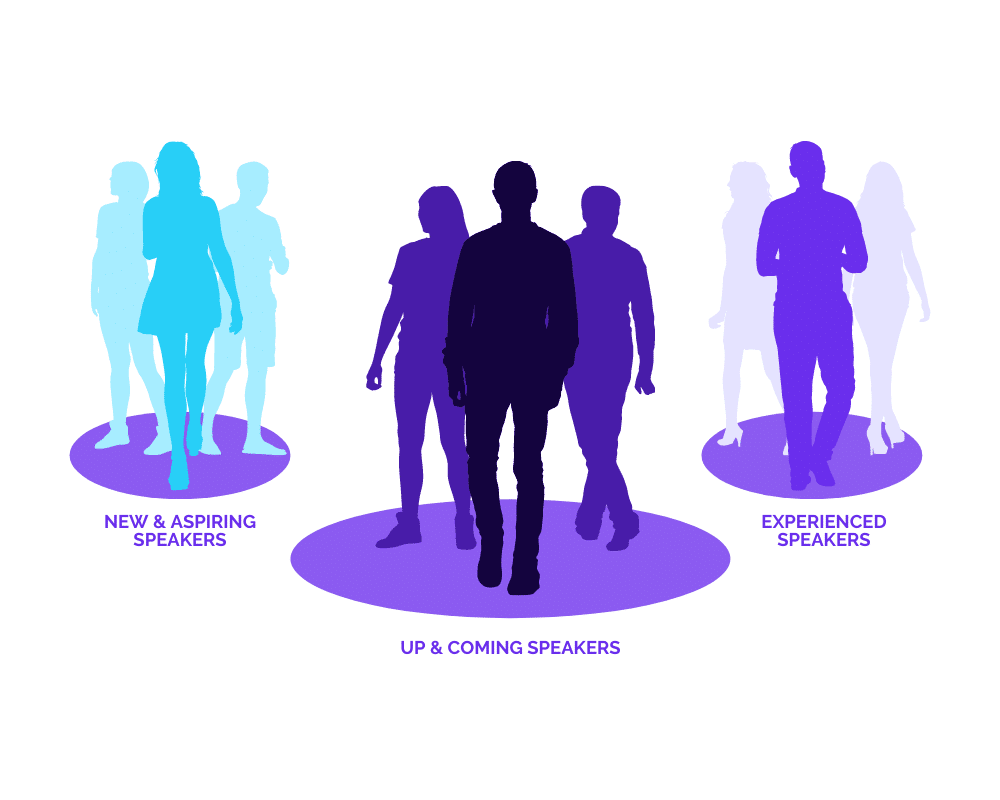
For example, the SpeakerFlow team focuses on four speaking industry topics: sales, marketing, operations, and technology. In these four areas, we not only provide software to help professional speakers. We also offer paid implementation, a variety of content, and loads of free resources. With these services, we help speakers identify where in their business they can improve, then plan how to do so.
Nevertheless, there are still plenty of things we’ve learned from other business owners. From finances to tax strategy to company organization, we can’t be an expert in everything about running a business, and despite our experience, we’re still learning to be better coaches, communicators, and business owners every day.
Likewise, you’re already a good speaker and a good thought leader. If you weren’t, you wouldn’t be reading this and trying to share your message with a wider audience. However, if you want to be the best you can be, there’s no shame in learning from those around you. Not only will it save you time and money. It will also keep you on an upward trajectory, so your business continues to grow in the coming years. What’s not to love about that? 🙂
